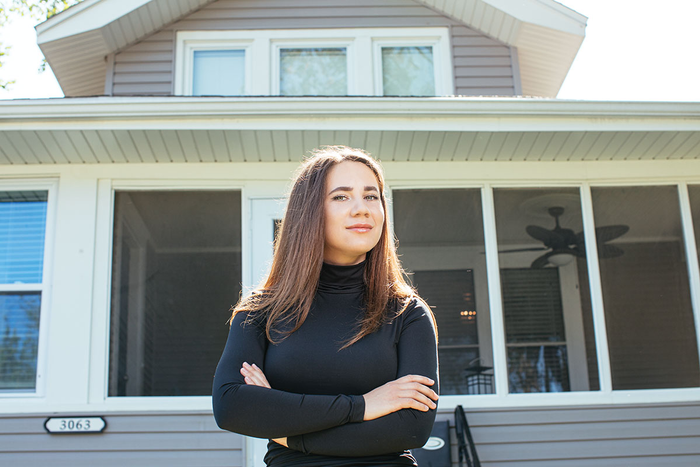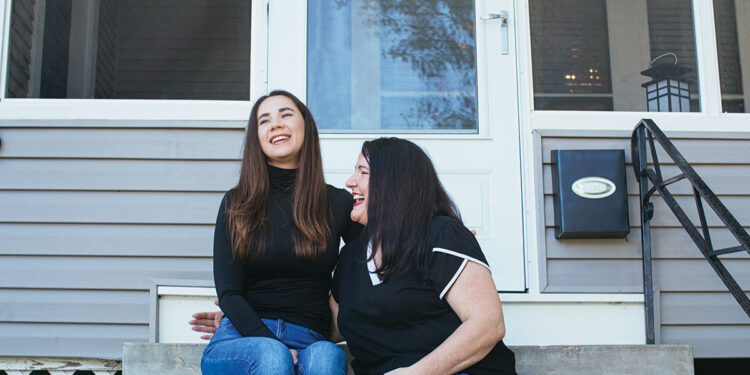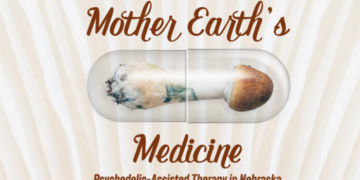It was an otherwise uneventful early March afternoon in Omaha. Kelly Lytle was in her living room texting with a friend in Eastern Europe.
That’s unexceptional, as things go. Lytle, then 49, had spent much of her adult life immersed in the region, helping its people, particularly orphans, and has many contacts there.
The friend she’s texting is Iryna Shchoholeva, 22, who is like a daughter to Lytle. Shchoholeva is Ukrainian, and the Russians were moving into her city.
In 2016, Shchoholeva had spent the summer with Lytle and Lytle’s family in Omaha. She did many of the things 16-year-olds in Omaha do: eat soft-serve ice cream at Runza, go to the zoo, shop at Westroads Mall for clothes.
Nearly six years later, midnight was approaching in Ukraine, and Russian tanks were maneuvering in forested darkness by the dacha (Russian for lake house or summer cottage) where Shchoholeva hid just outside the city. Russians were firing huge cannons. It was so loud. Shchoholeva stared crying. She reached for her mobile phone and tapped out a message to Lytle: “I think I am going to die tonight.”
Said Lytle: “I’m 7 thousand miles away. And I have absolutely nothing, not one thing, I can do–not one—but pray, and message her all through that night, to be with her that way, and to tell her…‘you are as much my daughter as if I had given birth to you. And I love you. And I will always love you. And we will be together again.’”
Lytle lived in Eastern Europe, made multiple trips to Ukraine to assist children in orphanages there, and adopted three boys from Ukraine who are now adults in the Omaha area.
But getting Shchoholeva to the United States and safety would present challenges she had never dealt with before.
Lytle grew up in Bradenton, on Florida’s west coast. As a child, she, her mother, and her siblings escaped her abusive, drunken father.
At age 16, Lytle got a job in a bridal shop. She met a seamstress there, a refugee from Romania.
They became friends (and remain so). Lytle was with the woman and her family in their little apartment as she watched the overthrow of Romania’s communist government in 1989.
“We were watching her city…We were watching on this little TV with her, the overthrow of this communist government that had tortured her family and caused them to be refugees,” Lytle said. “So that probably had a huge impact on me.”
Lytle attended the University of South Florida in nearby Tampa, studying international development with a focus on Eastern Europe and the former Soviet Union. After graduation, she lived in Budapest and worked for an organization analyzing aid coming into Eastern Europe, interviewing recipients. Lytle’s mother moved to Omaha.
Lytle returned to Florida for graduate school, aspiring to move to New York City. But in 2001, her mother was diagnosed with lung cancer.
“I always like to say I took a sharp left on the map,” she said. “I ended up staying in Omaha.”
Eastern Europe, however, never left Lytle. Becoming a freelance writer and communications consultant in Omaha, her efficiency left her with some time on her hands. She approached John Jeanetta, who was the U.S. coordinator for a partnership between the cities of Omaha and Artemivsk (now named Bakhmut) in eastern Ukraine.
In May 2005, she traveled with Jeanetta to Artemivsk, visiting a trio of orphanages and a children’s hospital. It was the first of many trips.
“Kelly toured all those different places…and figured out what they needed besides clothing and vitamins and cribs,” Jeanetta said.
The hospital needed an industrial-sized washer, water heaters, and mattresses not made of straw. She talked to donors.
Lytle “had a transformative impact on those systems over there,” Jeanetta said.
It was the orphanages where Lytle felt most connected, having been a vulnerable child herself.
“What I saw was that the need in Ukraine was…as great or greater than it had been for Romania in the 1990s, especially for vulnerable kids,” Lytle said. “And that really is my soft spot, for orphans.”
Lytle started Operation Ukraine, a volunteer organization working with orphanages. She adopted three boys, at ages 8, 9, and 16. They are now 22, 23, and 30.
Shchoholeva, like Lytle’s sons, grew up with her brother in an orphanage. Born in a village near the city of Chernihiv, in northern Ukraine. Her mother was dead. Her father was missing and presumed (and, later confirmed) dead.
She entered Lytle’s life through a program where orphans could spend the summer in the United States or Western Europe. She initially stayed with a family in Texas but when that didn’t work out, a friend of Lytle’s asked if Shchoholeva could stay with the family. “Of course.”
“She stayed with us over the summer and just became part of the family,” Lytle said. “She’s marvelous.”

Photo by Bill Sitzmann
They remained close after Shchoholeva returned to Ukraine. Shchoholeva went to college, earning the Ukrainian equivalent of a bachelor’s degree in business. She got a job with the Puma corporation.
In November, Lytle made her most recent trip to Ukraine, visiting the city of Bakhmut and also Shchoholeva. They talked of her possibly studying English at University of Nebraska at Omaha to help her get into graduate school.
Shchoholeva didn’t believe war would come. Life was so normal in Chernihiv. How could there be war? On the night of Feb. 23, she went out with friends, going to bed at 4 a.m. An air-raid siren blared one hour later.
She called Lytle, who told her to grab documents, clothes, and food. Shchoholeva stayed with a family friend at a dacha 15 minutes from the city.
Chernihiv, population nearly 300,000, is on the main highway from Belarus to Kiev, key to the Russian advance in the early days of the war.
At the dacha, the days were quiet but the nights terrifying.
“It was the worst. They did a lot of shooting at night,” Shchoholeva said, sitting in a Starbuck’s in Omaha in June, with Lytle translating Shchoholeva’s Russian into English. “Everyone slept very badly because you never knew when the next bombs would come.”
The night she texted Lytle might not even have been the worst. Once, a neighboring dacha was hit by a shell, causing its collapse. Once the shelling stopped, Shchoholeva and her friends ran out, removed wreckage and freed the family trapped on the ground floor. They survived.
Shchoholeva and her friends knew they had to leave. Stuffing themselves in an old Hyundai, it took three attempts before they finally made it to Lviv, near the Polish border. What should have been a seven-hour drive took three-and-a-half days.
Shchoholeva split up with her friends, crossed into Poland on a bus, and stayed in an Airbnb efficiency apartment Lytle rented for her in Krakow.
Lytle booked herself a flight, Omaha-Chicago-Munich-Krakow. She met Shchoholeva at the Airbnb.
“We had a good long cry,” Lytle said. “And we didn’t know what the plan was.”
She could not leave Shchoholeva alone, not at the edge of a war zone.
“I couldn’t just lose her to the chaos of war,” Lytle said. “And that was a real possibility.”
The next step was a train to Warsaw. The Krakow station was glutted with people fleeing Ukraine.
“I’ve never been standing in a sea of new war refugees,” Lytle said. “It was just masses of people with one backpack or one plastic bag of stuff…it’s all these single moms and young people and all these families without their men except for their grandparents.”
Word was the U.S. Embassy in Warsaw was overwhelmed. So Lytle and Shchoholeva flew from Warsaw to Riga, Latvia, and got an expedited appointment at the U.S. Embassy there. Shchoholeva received a tourist visa and arrived at Eppley Airfield April 2.
She is now in an accelerated English program at UNO and living with Lytle and her family in Omaha.
As Lytle’s 50th birthday loomed this summer, she asked friends and loved ones to donate to a Ukrainian cause rather than buy a gift. Or, if not that, a cause important to them.
“It’s nice to have people respect you for being a good person. But that’s not why [I] do it,” she said. “I get such joy and such fulfillment from having been able to help people…I hope I can have as many more [birthdays] as possible so I can keep doing this.”
That passion, Jeanetta said, has allowed Lytle to mitigate an otherwise dreary existence for children in Ukrainian orphanages.
“The lives that Kelly has impacted through basically her volunteer work in Ukraine over the past 20 years, I couldn’t even begin to calculate the number of people who have benefited,” he said. “She has truly transformed the lives of the people she has touched. Deeply.”
Shchoholeva said she would like to return to Ukraine. Her brother is there. She doesn’t know when that will be or what will be waiting for her when the time comes.
Update:
Iryna Shchoholeva has returned to Ukraine, leaving Omaha on July 25. The reason can be summed up in one word: homesickness.
“She got back to Chernihiv and she’s staying with a friend and her sister who live in a very small apartment,” Lytle said. “I think she is glad to be back with her friends. She sent me a lot of pictures of the destruction in Chernihiv. I think that was eye opening for her…The biggest challenge now is to find work of some sort.”
That could be tough. The Ukrainian National Bank estimates the unemployment rate there to be 35%, according to the Kyiv Post. Rents are sky-high in safer cities because that is where everyone wants to be.
“It’s rough. Life is a struggle, that’s for sure,” Lytle said. “The war has totally destroyed the economy…Food availability in cities is getting tighter and tighter, and with winter coming there is a lot of fear as to what this is going to be like.”
Shchoholeva loved learning English at UNO, making new friends from all over the world.
Lytle is in the process of bringing a 37-year-old woman and her 13-year-old daughter to Omaha. She knows the family from her travels to Bakhmut, the eastern Ukrainian city Omaha has partnered with – the woman is the oldest sister of Lytle’s oldest son. The mother is getting a passport, a slow process with so many Ukrainians trying to get them. The woman’s husband is not able to leave because of the war.
Lytle says: “Their city is being destroyed. They won’t be able to go back.”
This article originally appeared in the September 2022 issue of Omaha Magazine. To receive the magazine, click here to subscribe.













